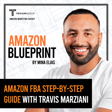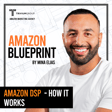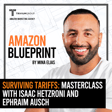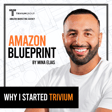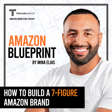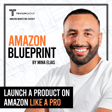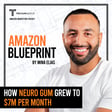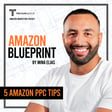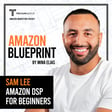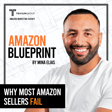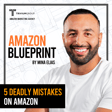Become a Creator today!Start creating today - Share your story with the world!
Start for free
00:00:00
00:00:01

AI tools EVERY Amazon FBA seller needs..
In this episode, I sit down with my good friend Yoni Steinschriber, founder of Elev8 Brands and Amazon Expert.
We discuss new AI tools that we've been using that changed the game for Amazon Sellers. These AI tools can help with: 🚀Amazon SEO 🚀Amazon PPC 🚀Data & Analytics 🚀Ranking 🚀Optimizing your listing & more 🔥
If you use AI in your business the right way, it can help you get more results and save so much time.
Need help scaling your brand on Amazon? Click here to get a FREE audit from my agency: https://hubs.la/Q02N7K130
Transcript
Impact of AI on Amazon Sellers
00:00:00
Speaker
Welcome back to the Amazon Blueprint Podcast.
00:00:06
Speaker
By now, everyone has heard of the AI craze, AI this, AI that, but how does that relate to Amazon sellers? In this video, I'm joined by my good friend and Amazon expert, Yoni, and we're going to talk about all things AI, how AI has advanced inside of Amazon and all the AI tools you need right now to be making more money on
Amazon's Generative AI Tool
00:00:23
Speaker
Amazon. All right, let's start with generative AI. Awesome. Thanks for having to me, Amina. So let's start with talking about what generative AI is. So it's Amazon's first seller facing tool. What it does is it goes into Seller Central and can do a number of things.
00:00:35
Speaker
So the first really cool tool, and I think this is typically for larger sellers, is you can actually put in D2C URLs, and Amazon will now automatically generate listings for you. So that'll be the title, the bullet points, the descriptions, backend attributes specifically. And we'll get to why that's so important, especially now with backend attributes. um But it does a really good job of implementing that. Now, obviously it's new. There's a lot of sort of beta things that are going on with it, but as it continues to progress, it's going to be a really good tool, especially for brands that have hundreds or thousands of SKUs when you need to really implement your catalog in that type of way. That's awesome. I assume that Amazon is trying to incentivize brands that are not already on Amazon to try and get them on Amazon easier, right? One of the hardest parts is how do you build a listing? The backend is pretty confusing, but if all you have to do is add a yeah URL, it pulls everything from that URL, puts it in and you build a full backend, you know, title, book, points, description that makes life a lot easier. Yeah, absolutely. I mean, as you know, there's a lot of tools out there that do a lot of third party seller listing automation creation. So I think Amazon is trying to get ahead of the curve, you know, from their competitors like Walmart, Target, e etc, make it as easy as possible, especially for large corporations who have so many skews have minimal resources to put on Amazon, give as much access to these brands to make it as easy for
Streamlining Listings for Small Sellers
00:01:48
Speaker
them to use as possible. So the next thing that's really cool um is the listing content generator. And that's gonna generate listing content essentially in a few words. So if you go into now the, and this is actually live for most sellers now, if you go into the product listing builder and you add a new product, you can start from scratch. And one of the things you can do now is just implement a few keywords, up to a thousand characters. And what that does is it gives Amazon a framework. It will generate your title, bullet points, backend keywords, and attributes automatically for you. It makes it easy for smaller sellers to go in and quickly upload their new listings, as well as it gives them a framework to start. Now, I wouldn't say that it's perfect. I think, like everything in beta, there's a lot of work that needs to be done, but it gives you a really good framework, especially for what Amazon's AI is looking for. And the reason that's going to be so important, we'll talk about it in a second, is there's a lot of customer facing AI now, and we need to talk about how we're going to be able to leverage our ability as sellers to get in front of those
Conversational Shopping with Rufus
00:02:38
Speaker
AI facing customers. All right, speaking of that, let's talk about AI-powered shopping. What is AI-powered shopping? I know there's Rufus that came out that is essentially an AI chatbot for shoppers on Amazon. Why don't you bring that down for us? Yeah, absolutely. So, AI-powered shopping experience, which is called Rufus, is a new AI tool, still in beta, so a lot of customers don't see it yet, but it's a new beta tool that allows Amazon customers interact with Amazon in a much more conversational way.
00:03:05
Speaker
For example, someone could say, hey Rufus, I need to buy flip flops for my five year old daughter. What are some options that work really well at the beach? Right? There's a lot more context in that question than there is oftentimes in even long tail search terms. And so what it does is it gives the customer the ability to have an interactive experience and really refine sort of what they're looking for on the platform.
00:03:27
Speaker
And so what that means for the customer is an easier shopping experience, ah more seamless, and a specific identification of products that fit their criteria. um And that's different than obviously what we've seen in the past, where you have to go and you have to type a certain search term, right? Someone doesn't like what's popping up, they go and search another search term, et cetera, and sort of go through that line. And so what we'll see is potentially higher click-through rates for the for the listings that are generated because once they get to the point of seeing that product, they're pretty refined in what exactly they want.
00:03:58
Speaker
That's cool. And obviously that's what we are going to be doing, right? We're going to be shopping in an easier way. I'm not going to be typing in search terms much longer. I would prefer to, you know, like the same way chat GPT has that function where you can talk to it. I would like to just talk to it and say, Hey, I want this. I want that. Refine it by this, refine it by that. Tell me why this one is better than that one. Tell me a summary of reviews in that one. So it's going to be very important for us to optimize our listings.
00:04:21
Speaker
for Rufus. So can you talk about how do we optimize our listings so that we can take advantage? How do we get up on top, right? How do I make sure that Rufus recommends me over my
Holistic SEO Practices with Rufus
00:04:30
Speaker
competitors? Yeah, absolutely. So Rufus is going to take a lot of things into account, right? I think oftentimes we think of SEO specifically, we think of title, bullet points, description, backend keywords, right? And occasionally some attributes.
00:04:41
Speaker
This is going to be a totally different experience where Rufus is going to take holistic entire pages into account. So that's going to look at listing images, right? Keywords and words that are in the actual images themselves, right? AI can now read actual generative images. Amazon will be able to read those images and the actual words on the images and be able to use that in its algorithm to refine searches, right? So in addition to reviving your title, bullet points and keywords, you'll have a much more holistic approach, right? They're also going to be looking at things like reviews. So for example, Someone mentions, I want a chair that's really nice for a luxury dining set. right Amazon is going to refine its search by looking at customer reviews, people who have used in their descriptions, in their customer reviews, saying that this is a really luxury item, this is really high quality, things of that nature. And so making sure that we're tailoring our not only our ah SEO and our copy to what we're looking for, but actually tailoring the entire listing.
00:05:31
Speaker
And something obviously that you and I know is customer reviews are probably the the least facing thing. But the other part of it is is also pricing. It's something that we have tremendous power over. And so when we're talking about, you know, price differentials, I know you recently put out a podcast and seeing that when you actually increase price, you didn't see any conversion rate difference. It really optimized the bottom line, things like that.
00:05:50
Speaker
It's going to give a lot more refinement tools around pricing. And so those types of nuances are going to be even more prevalent, right? Making sure people are going to say, I'm looking for X, Y, and Z under $20, X, Y, and Z over $20, right? Those price points are going to make a bigger difference than what they had on the side of the filter, which almost no one ever uses, right? That side filter on Amazon that shows, you know, X amount of dollars to X amount of dollars, almost no one uses it. Less than 1% of people who are actually shopping on Amazon use those filters typically. So It'll be much more customer facing in all sort of holistic experience. So it's really really important that we don't just focus on text We focus on the listing images the quality that focus on the a plus content making sure that the selling points that we want are listed in there and more importantly it's more going to be more important to
00:06:32
Speaker
create listings that are beautiful that sound great to the amazon algorithm as opposed to keyword stuffing which you and i've been on amazon for a long time the sort of like the go-to of what we used to do um so we're changing that skill set changing from keyword stuff and getting as many things as we possibly can into this to make sure that we index for all of these types of things When search terms become less and less and less prevalent and more obsolete and conversations become more prevalent and less obsolete, then we're going to see less prevalence for keyword stuffing and more prevalence for highly optimized listings that target the selling points that we want to convey.
00:07:07
Speaker
Yeah. And essentially, I think it's going to end up being this feedback loop of let's identify what Rufus is looking for. Right. Because at the end of the day, right now, we don't know what they're looking for. We don't know what customers are looking for. We can base it off of search volume for keywords. So right now, if I want to sell a product, I'm like, OK, what are the main keywords? What are people looking for? And that's how I'm optimizing. And then I'm going in, building the listing and adding those keywords. But then Rufus is going to be way deeper, right? It's going to be like, people are looking for all of these things under these price points and so on. So just being able to use that feedback and then refine my listing. Like you said, title, of bullet points, backend search terms, ah main image listing images, A plus content, and even reviews, right? We can technically manipulate the reviews and write things in the reviews. I'm sure the question and answer a box, right, where you ask questions. and answer them. So all of that will become way more important. Now, I know a lot of people and a lot of brands are not working with a lot of the listing. They're just kind of focused on the main stuff. The title of the bullet points, their images are okay. A lot of times they're showcasing a lot of lifestyle images without enough info graphics. So that is all going to change the stuff that I've been saying for a while.
00:08:08
Speaker
Images are going to matter way more. Selling points on the images are going to matter way more. Q and&A is going to matter way more. Reviews and and what you type in the reviews, not just getting them, but also having people type in specific things so that Rufus starts and interpreting them better. That's all going to matter more. All
Essential Tools for Amazon SEO
00:08:23
Speaker
right. Finally, let's talk about the top two AI tools that are currently used. The first one is Data Dive. Now, Data Dive, in my opinion, is the best Amazon SEO tool out there on the market.
00:08:31
Speaker
Essentially what it does, it's a combination of taking you know keyword searches from Jungle Scout and then mapping it out in a very easy to see way. So it takes the relevant keywords, highest search volume, shows them first, shows your organic ranking, your sponsored ranking versus those keywords. But also it gives a quantity like a number to your title and bullet points SEO value.
00:08:51
Speaker
So for example, I can take 10 competitors and my product and I can say, you'll rank number six out of your 10 competitors in terms of title SEO optimization, which means there's all these keywords your competitors have that you don't. And so what I can do is I can then quickly optimize my title and change words and things like that to essentially get a higher SEO value. And what I've seen is that increases revenue, right? Because you start indexing and ranking for a lot more keywords and a lot higher for keywords, and that is going to drive results.
00:09:18
Speaker
Now, here's the AI component of that. Once you build the master keyword list on Data Dive, so basically you pick the competitors and then you go through the keywords and then you refine them. You eliminate anything that doesn't make sense. You keep all the good ones and now you have a really good master keyword list. You can use AI, aka chat GPT, to write your title and your bullet points for you. And so what they can do is they can look at all the competitors and they can look at your title and bullet points and then they can optimize it based on the keywords in the master list, based on the high search volume ones being the most important, and it can write a title and bullet points for you. Now, here's the thing, when you make it write the title and bullet points, just make it write 60% of it, right? You want to leave 40% open for you to make it readable. AI is going to generate a title and bullet points that is largely, you know, kind of AI, right? It's just a lot of the right keywords. It's not going to read well to humans. So you want to leave about 40% so you can rewrite it slightly where that copywriting and and sounding good aspect comes in.
00:10:11
Speaker
Yeah, absolutely. I mean, I use AI all the time, specifically and in listening optimization. And I think, you know, obviously, like you said, leave room for human effects. But the time that it's reduced on my team, personally, um we used to take, you know, about an hour to an hour and a half to write one listing. Now we're talking, you know, 1015 minutes oftentimes to create a listing at at the basic level. And so um just the time management of using that AI is going to be so, so huge, especially the large organizations that have hundreds, thousands of listings that they need to create. Exactly. And the second one that I use the most is right now, Jungle Scouts who Review AI. So for the longest time, what I used to do is I used to go into my competitor's listings, download the reviews using the Helium 10 Chrome extension review downloader, download with the reviews, and then I would take all the one stars, feed them to chat GPT, take the five star, feed it to chat GPT, and then ask it to summarize it for me.
00:10:58
Speaker
Now, Jungle Scout did that all in one sweep. So you can look at every single listing and it creates a full summary of what are people saying about this product? What are the good things? What are the bad things? And what are the areas of opportunity for that product? And why that's amazing is number one, when I'm trying to build my listing, I want to make sure that I showcase that my product is better than everyone else. And the only way to do that is to know all of their flaws and then highlight that my product doesn't have any and to know all the good things that they have and highlight that my product also has all of those good things.
00:11:25
Speaker
But the other thing is in research and development, right? So if I launch a product, it's never just going to be the same product forever. It's always, I'm in touch with the market. I'm looking at what are people saying? What do they not like? What do they like? you know What are the new trends? And I'm always incorporating that in my next version of my product, V2, V3, V4. Every six months to a year, I'm trying to improve my product at least 5% or 10% because I know that if I just you stay the same, stay stagnant, you know the market changes, people's demands become different, people's choices change. so I used to actually have an electrolyte powder that was just a powder. It was in a a canister. It was 100 servings. It was very economic. All of a sudden, my sales started going down slowly. And I'm like, why is this happening? People are buying more and more electrolytes. And it turns out that five years ago, no one wanted single-serve packaging because they're like, it's so bad for the economy. And now everyone wants a single-serve packaging, right? Because everyone just wants to have their electrolytes as they travel and all that kind of stuff. And so the market demand changes. People want different things. So you always have to stay on top of them. and You know, Jungle Scout's tool is one of the very cool and easy ways to do that. That's really good for me to know. I've i've used a lot of brand analytics. You know, you can go into sort of the, and also the product opportunity explorer, you can go into specific categories. The problem with that is that Amazon sort of redefines the categories for you upfront. And this way it sounds like you can actually identify the the specific competitors that you want to target, the specific competitors that you're looking at to get a much better sense of your niche market, right? And so I think that that's a really, really powerful tool to get a little bit more specific than what Amazon provides at the moment.
00:12:50
Speaker
All right guys, hope you guys enjoyed this video. I made another video about listing optimization on Amazon. It's literally a masterclass, step by step. Every single thing you need to do to optimize your listing on Amazon, if you guys don't know, optimizing your listing means you're gonna have a better click-through rate and a better conversion rate, which means for your exact same advertising spend you're going to make. So make sure to check out that video. And if you guys have any questions, please leave them in the comments. I'll make sure me or Yoni get to them, and I'll see you guys in the next video.
